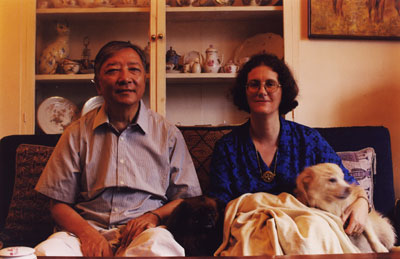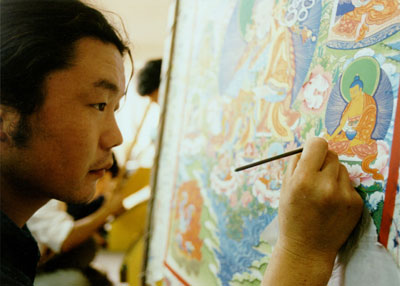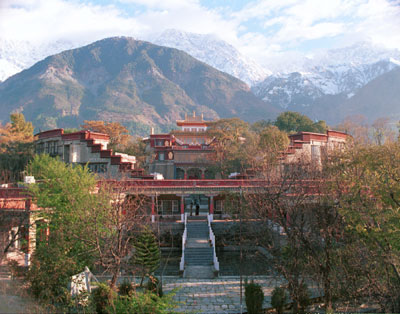Culture Works: Kim Sciaky Yeshi '77
I was determined to go and live somewhere like India ever since I can remember,” said Kimberly Sciaky Yeshi '77, an American expatriate who educates, employs, and provides housing for approximately 300 displaced Tibetans in Dharamsala, India. As founder and managing director of the Norbulingka Institute, named after the Summer Palace of the Dalai Lama, she helps keep Tibetan arts, language, and writing alive.
Inaugurated in 1995 after nearly a decade of planning and construction, the institute, a trust chaired by the Dalai Lama, was built almost entirely on donations. Running Norbulingka with Tibetan husband Kalsang, formerly a monk, is “definitely a team effort,” Yeshi said. She, as the managing director focuses on human resources and sales, overseeing production and workshops and marketing the products. As the director, Kalsang—who was formerly chairman of the Dalai Lama's cabinet and before that secretary of the Department of Religion and Culture—established the institute's Literary and Cultural Research Center, which publishes Tibetan literature, and the Academy of Tibetan Culture, a college-level study program in Tibetan studies mainly for newly arrived students from Tibet. For the past two years, Kalsang has also been directing the team working on the official biography of the Dalai Lama.

Yeshi with husband, Kalsang
At Norbulingka, new arrivals from Tibet and second-generation Tibetan refugees are trained in the traditional arts of Tibet, reviving ancient methods that are gradually becoming extinct. They work as a group under a master, creating exquisitely crafted metal statues of Buddhist deities, Thangkas (religious paintings hung to enhance contemplative experience), or traditional carved furniture. These are made the way they were hundreds of years ago and can be commissioned on order. Others make items to be marketed, ranging from home furnishings to clothing and which find their place in the modern home setting. Sales of the products, as well as rentals of two guest houses, help subsidize Norbulingka. With tourism ever-mercurial, Internet sales help stabilize income, Yeshi said, but further fundraising is essential to support the institute's growth—including plans for additional housing, schoolrooms, and a new statue workshop.

The study of Tibetan arts
A practicing Buddhist by the age of 16, Yeshi knew early on that she wanted to live in Asia and “do something other people didn't usually do.” She followed in the footsteps of her three sisters by attending Vassar, which provided “a broad education, a way to look at and analyze things.” She became an anthropology major, further pursuing her Eastern interests, and took Tibetan language lessons in New York City, where she met Kalsang, who was her instructor.
Yeshi went on to the University of Virginia for a Ph.D., so she could teach Tibetan Buddhism. Kalsang, who was already teaching part-time at the University of Pennsylvania, joined her in the program. In 1979, after graduating and marrying, they settled in Dharamsala because, as Yeshi explained, they had “decided to come to work for the Tibetan cause instead of pursuing an academic career. Deep down, I wasn't interested in a life lead by routine,” she said. “I never regretted my decision, and I am happy that we both had the courage to make the leap.” In India, the Yeshis started a family, sharing their home with monks and planning for construction of Norbulingka.

The Norbulingka Institute
Although Yeshi herself has never been to Tibet, and her husband has not been back since leaving in 1959 (their two elder daughters have visited the country “and like it very much,” she said), she is thoroughly devoted to preserving its culture. Foregoing academia, she has found a new kind of home, commenting, “I travel often and feel adjusted everywhere, though I like best being home in Dharamsala.” Kim Yeshi has realized her lifelong dream of going East.
Though not a buddhist, Anguin-Cohen studies Buddhist Insight Meditation as well as hatha yoga in New York.
If you'd like to help the Norbulingka Institute in their efforts to preserve Tibetan culture, tax-deductible donations can be made online at www.norbulingka.org, or write to Norbulingka Institute USA, c/0 Stoneman, Chandler & Miller, 99 High Street, Boston, MA 02110. Selected Tibetan gifts, fashions, furniture, and artwork are available from the Norbulingka online catalog found on the above Web Site.
